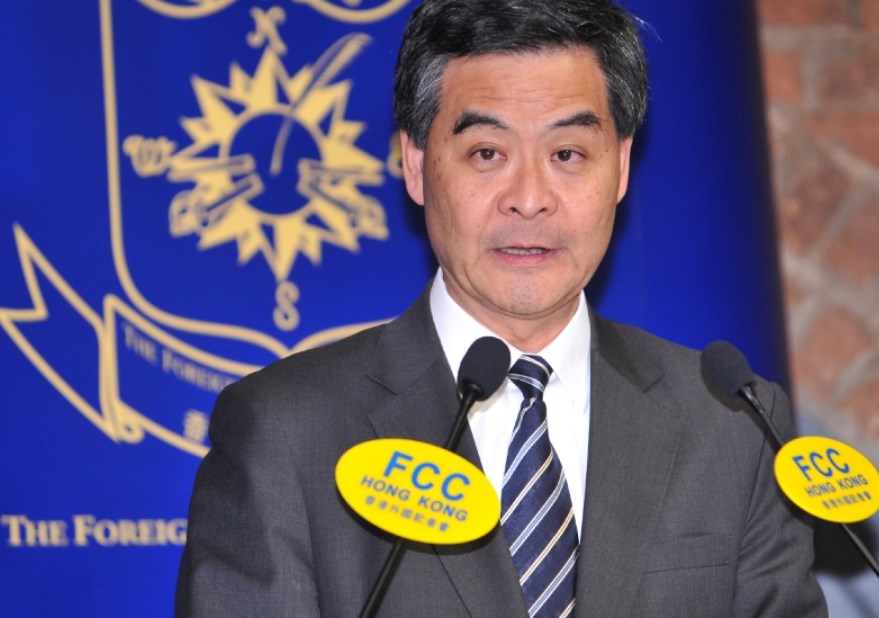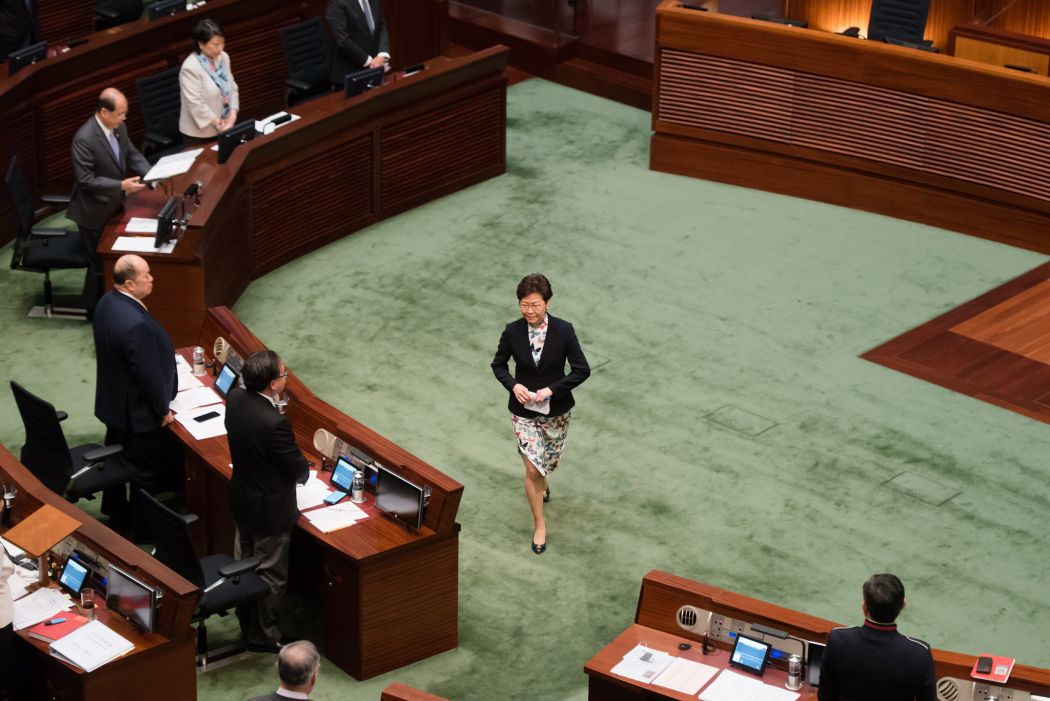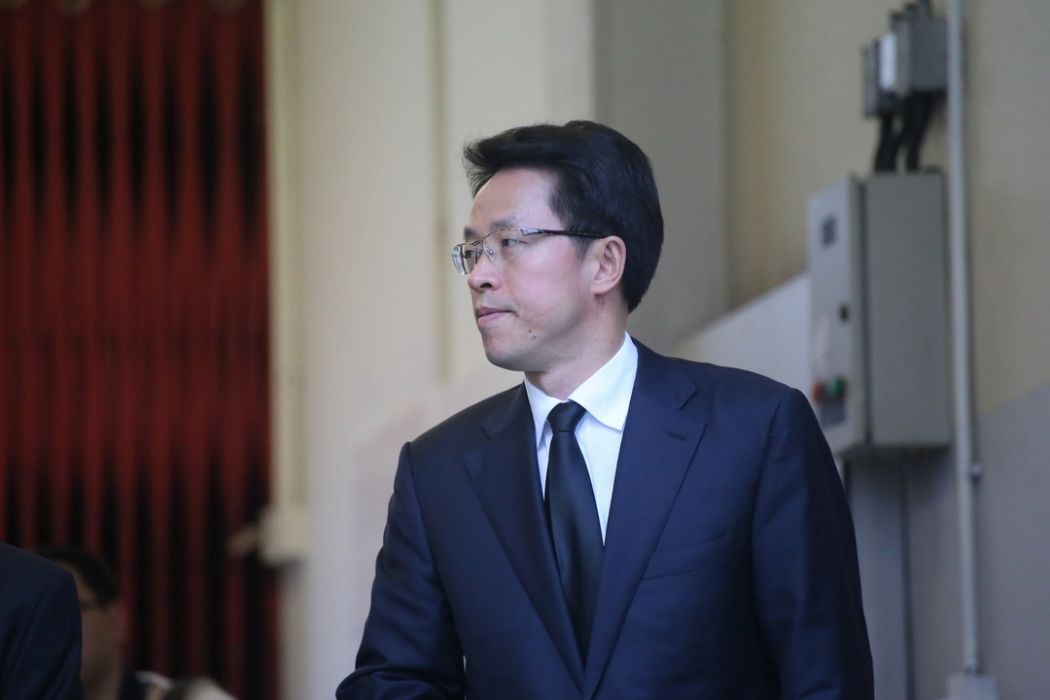In one of the six vignettes that make up the 2015 dystopian film Ten Years, government officials stage a fake assassination to justify tighter state control. It all works according to plan, and the story ends with an ominous news broadcast: “This incident provides ample proof to the central government that foreign powers have infiltrated our city and that a national security law can no longer be delayed.”
The short film paints a frightening future of Hong Kong, but its storyline is nothing new. Manufacturing a crisis to legitimise a political agenda is not only an old trick in the Communist Party’s playbook, it is also a tactic frequently and increasingly used by the ruling elite in Hong Kong.
And nobody does it better than C.Y. Leung—former chief executive and now vice chairman of the influential National Committee of the People’s Political Consultative Conference.

Hardly anyone batted an eyelid when the Foreign Correspondents’ Club first invited Andy Chan Ho-tin, convener of the Hong Kong National Party, to speak at the club.
After all, Chan has been in the news since the government announced plans to ban his political party, and the FCC did what a press club does: invite newsmakers to say a few words and take some questions—as Chan has done on numerous other occasions including the televised City Forum held weekly at Victoria Park.
Besides, the FCC has never been shy about hosting controversial figures. Over the years, actress-cum-China critic Mia Farrow, Donald Trump supporter Ying Ma, and the chief architect of Occupy Central and the bane of Beijing, Professor Benny Tai, have all taken the club’s podium. Last November, Joshua Wong was invited to appear at a literary event at the FCC after the student activist was barred from the Asia Society.
But things began to unravel two weeks prior to Chan’s scheduled talk, when a representative from the Chinese Foreign Ministry paid a visit to the FCC and urged its board to “reconsider its decision” to host him.

Suddenly and curiously, C.Y. Leung came out of the woodwork and, like Trump with his trigger-happy Twitter account, began putting out blistering statements attacking the club almost on a daily basis. He hinted at evicting the FCC from its coveted Central address and compared hosting Chan to supporting Nazi propaganda and anti-Semitic hate speech.
Leung’s ambush caught Carrie Lam and other Beijing loyalists off guard, as they had hitherto been muted over Chan’s talk. They—together with party mouthpieces like Wen Wei Po and Ta Kung Pao—scrambled to fall in line with stepped-up rhetoric.
Not to be left out, Voice of Loving Hong Kong and other pro-Beijing groups heard Leung’s call to arms and descended on the club like angry villagers with torches and pitchforks—a scene lifted straight from Frankenstein.
As a result of the unexpected media frenzy, more club members showed up at Chan’s lunch talk and more people around the world watched the live stream on social media than they did any other FCC event in the club’s 75-year history. If the idea was to starve the independence movement of attention or let it die by anonymity, then Leung would have failed miserably.

Clearly, that wasn’t his intent, nor was it the intent of the Security Bureau when it decided to shut down Chan’s party in the first place. Just when the phrase “Hong Kong independence” was about to fall off the radar, Leung and others government officials breathed new life into it.
Like the staged assassination in Ten Years, the independence movement was resuscitated to justify a tighter grip on civil society and to earn brownie points from Beijing.
Some are wondering whether C.Y. Leung smelled blood after the government’s recent move against Chan’s party and wanted to jump on the bandwagon out of FOMO—Fear of Missing Out. To be sure, independence has always been Leung’s signature issue. It is his territory.
The independence movement has served his political career well. After the Occupy protests erupted on Leung’s watch in 2014 and his ratings plummeted in the aftermath, Leung made a big public display of his zero-tolerance policy against fringe separatist groups, not only to create a diversion but also to give himself a new mandate.

He launched a one-man crusade against a crisis that wasn’t even there—a crisis he had created himself. It even earned him the nickname “Father of Hong Kong Independence” on social media.
That may explain why the semi-retired Leung appeared out of nowhere to go after the FCC, knowing full well that his frontal attack on the international press corps would get himself maximum air time and reaffirm his role as chief counter-independence officer.
But there may be more to Leung’s sudden return to the public eye than protecting his turf and staying relevant. Already, speculation is swirling over whether he is after a new role that Beijing may be setting up to oversee national security and territorial integrity in Hong Kong.
If so, Leung wants to be first in line for the post—and all the funding and power that come with it—as a reward for his labour and loyalty.
It is also possible that Leung’s goal was purely spiteful: to undermine his successor Carrie Lam and make her look weak and incompetent. As if acting on cue, Zhang Xiaoming, a long time Leung ally and now director of the Hong Kong and Macau Affairs Office, criticized the current administration for its “inadequacies” in curbing the spread of independence, an unusually in-your-face rebuke from a high-ranking Chinese official.

Some observers have gone so far as to suggest that Leung might be laying the groundwork for his return to the top job to avenge being unceremoniously replaced by Lam in 2017.
Whatever Leung’s motives may be, the FCC has taken a bullet in the crossfire of his one-upmanship. Whether the club will come out of this political storm unscathed depends on how much Beijing, with its growing confidence on the world stage, still cares about its image in the watchful eye of the international press.
The only thing certain is that organizations like the FCC will be tested at greater frequency and intensity in the years to come.
Sadly, the real casualty of collateral damage is the city’s freedom of expression. Soon, it will be wrong, or even criminal, to interview or report on Chan and others on his end of the political spectrum, on the grounds that any mention of their kind provides a “platform to promote a dangerous ideology”.
The FCC saga has started Hong Kong on a slippery slope of Orwellian state control, restricting not only our action and speech, but also our thoughts. However far-fetched and alarmist Ten Years appeared to the audience two years ago, that version of Hong Kong is already here.
